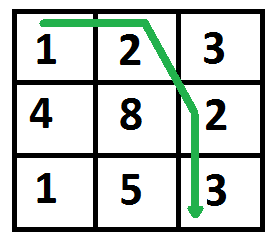DP6 最小路径花费 Min Cost Path @geeksforgeeks
2013-12-24 02:19
525 查看
Dynamic Programming | Set 6 (Min Cost Path)
Given a cost matrix cost[][] and a position (m, n) in cost[][], write a function that returns cost of minimum cost path to reach (m, n) from (0, 0). Each cell of the matrix represents a cost to traverse through that cell. Totalcost of a path to reach (m, n) is sum of all the costs on that path (including both source and destination). You can only traverse down, right and diagonally lower cells from a given cell, i.e., from a given cell (i, j), cells (i+1, j), (i, j+1) and (i+1,
j+1) can be traversed. You may assume that all costs are positive integers.
For example, in the following figure, what is the minimum cost path to (2, 2)?

The path with minimum cost is highlighted in the following figure. The path is (0, 0) –> (0, 1) –> (1, 2) –> (2, 2). The cost of the path is 8 (1 + 2 + 2 + 3).

1) Optimal Substructure
The path to reach (m, n) must be through one of the 3 cells: (m-1, n-1) or (m-1, n) or (m, n-1). So minimum cost to reach (m, n) can be written as “minimum of the 3 cells plus cost[m]
“.
minCost(m, n) = min (minCost(m-1, n-1), minCost(m-1, n), minCost(m, n-1)) + cost[m]
2) Overlapping Subproblems
Following is simple recursive implementation of the MCP (Minimum Cost Path) problem. The implementation simply follows the recursive structure mentioned above.
package DP;
public class MinCostPath {
static int R = 3;
static int C = 3;
public static void main(String[] args) throws Exception {
int[][] cost = { {1, 2, 3},
{4, 8, 2},
{1, 5, 3} };
int m = 2, n = 2;
System.out.println(minCostRec(cost, m, n));
System.out.println(minCostDP(cost, m, n));
}
/* A Naive recursive implementation of MCP(Minimum Cost Path) problem */
/* Returns cost of minimum cost path from (0,0) to (m, n) in mat[R][C]*/
public static int minCostRec(int[][] cost, int m, int n) throws Exception{
if(m<0 || n<0){ // 注意这里返回INT_MAX最大值
return Integer.MAX_VALUE;
}
else if(m==0 && n==0){
return cost[0][0];
}else{
return min3(minCostRec(cost, m-1, n-1),
minCostRec(cost, m, n-1),
minCostRec(cost, m-1, n))
+ cost[m]
;
}
}
public static int minCostDP(int[][] cost, int m, int n){
// Instead of following line, we can use int dp[m+1][n+1] or
// dynamically allocate memoery to save space. The following line is
// used to keep the program simple and make it working on all compilers.
int[][] dp = new int[R][C];
dp[0][0] = cost[0][0];
/* Initialize first column of total cost(tc) array */
for(int i=1; i<=m; i++){
dp[i][0] = dp[i-1][0] + cost[i][0];
}
/* Initialize first row of tc array */
for(int j=1; j<=n; j++){
dp[0][j] = dp[0][j-1] + cost[0][j];
}
/* Construct rest of the tc array */
for(int i=1; i<=m; i++){
for(int j=1; j<=n; j++){
dp[i][j] = min3(dp[i-1][j-1], dp[i-1][j], dp[i][j-1]) + cost[i][j];
}
}
return dp[m]
;
}
public static int min3(int x, int y, int z){
return Math.min(Math.min(x, y), z);
}
}http://www.geeksforgeeks.org/dynamic-programming-set-6-min-cost-path/
相关文章推荐
- 动态规划之最小带权路径(Min Cost Path)
- GeeksForGeeks-Dijkstra’s shortest path algorithm最短路径
- hdu 1599 find the mincost route(无向图的最小环:求从一个点遍历所有节点以后回到原点的最短路径)
- Geeks面试题:Min Cost Path
- Geeks面试题:Min Cost Path
- leetcode64-Minimum Path Sum(最小路径和)
- LeetCode(Minimum Path Sum) 找到路径中和最小的
- C++求矩阵最小路径和进阶方法空间复杂度O(min {row, col})
- 【改进floyed】最小密度路径(path)
- [置顶] LeetCode--Minimum Path Sum (最小路径和)Python
- hdu 1599 find the mincost route(flyod求最小环)
- 最小路径和—Minimum Path Sum
- 2015 UESTC Training for Dynamic Programming N - 导弹拦截 LIS nlog(n)+打印字典序最小的路径
- 无向图最小环 hdu1599 (find the mincost route)
- 动态规划--最小路径和(Minimum Path Sum)
- 最短路+字典序最小+输出路径(Ideal Path,UVA 1599)
- HDU 1385 Minimum Transport Cost(Floyd+打印字典序最小路径)
- 【LeetCode-面试算法经典-Java实现】【064-Minimum Path Sum(最小路径和)】
- [leetcode]Minimum Path Sum 最小路径和
- 联通图形和最小花费路径(MCP)
